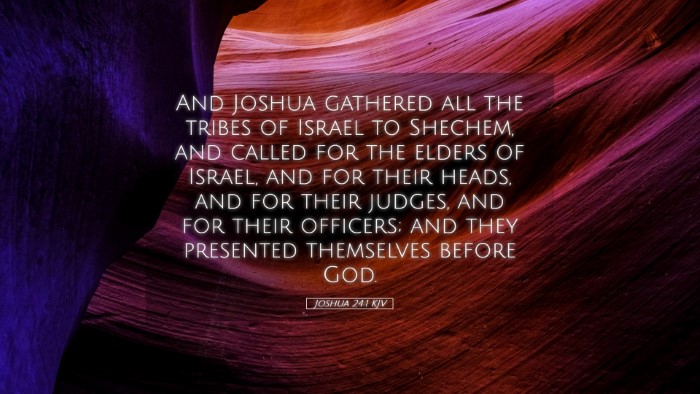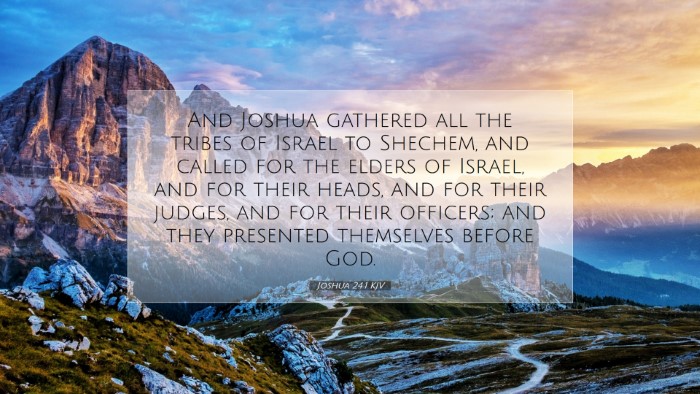Commentary on Joshua 24:1
Joshua 24:1 (NKJV): "And Joshua gathered all the tribes of Israel to Shechem, and called for the elders of Israel, for their heads, for their judges, and for their officers; and they presented themselves before God."
Introduction
This verse marks a significant moment in the history of Israel, as Joshua assembles the tribes at Shechem to reaffirm their covenant with God. Different commentaries provide insights into the implications of this gathering, the location's significance, and the nature of Israel's commitment to God.
Gathering at Shechem
-
Historical Context:
Shechem, a city nestled between Mount Gerizim and Mount Ebal, serves as a symbolic location for covenant renewal (Clarke). It was here that Abraham first built an altar to the Lord (Genesis 12:6-7) and later where Joshua would call for the reaffirmation of the covenant (Barnes).
-
Significance of the Gathering:
Matthew Henry notes that Joshua’s gathering of the people underscores the importance of collective commitment. The assembly of elders, heads, judges, and officers signifies the unity and leadership present in Israel's society (Henry). This collective action not only demonstrates accountability but also emphasizes the communal nature of their relationship with God.
Calling the Elders and Leaders
-
Spiritual Leadership:
Joshua's call to the elders and leaders is indicative of their responsibility in guiding the people spiritually (Barnes). Adam Clarke comments that these leaders were crucial in ensuring that the Law of Moses was upheld and that the people remained committed to God's commands.
-
The Role of Officers:
The presence of judges and officers reflects the importance of judicial and civil order in Israel. Matthew Henry emphasizes that effective leadership was essential for maintaining faithfulness to the covenant (Henry). Through their presentation before God, these leaders demonstrate their own accountability to divine authority.
Presentation Before God
-
Covenantal Faithfulness:
By gathering before God, Israel affirms its role in the covenant relationship established by God. Adam Clarke elaborates that this act represents a formal acknowledgment of God's sovereignty and a commitment to obey His commandments (Clarke).
-
The Nature of Worship:
Henry notes that coming together to present themselves before God underscores the importance of communal worship. It illustrates how the community is to engage with God collectively, facilitating an environment where faith can be renewed and strengthened.
Application for Today's Believers
-
Importance of Collective Worship:
This verse challenges modern believers to regard the communal aspects of faith. Just as Joshua gathered the leaders and people to reaffirm their commitment, contemporary gatherings can serve the same purpose in nurturing faith within communities.
-
Leadership in Spiritual Matters:
Pastors and church leaders today can draw parallels to Joshua’s example, recognizing their role in guiding congregations toward a deeper commitment to God. The necessity for spiritual leaders to model faithfulness and to hold their communities accountable is as relevant now as it was then (Barnes).
-
Renewal of Covenant:
The passage offers an opportunity for personal and communal covenant renewal. It invites believers to reflect on their relationship with God, re-committing to His ways as a demonstration of worship and obedience (Henry).
Conclusion
Joshua 24:1 encapsulates a pivotal moment of covenant renewal for Israel, inviting a reflection on the nature of communal commitment to God. Through the significance of the gathering in Shechem, the role of leadership, and the importance of presenting oneself before God, this verse offers profound insights for pastors, students, and scholars. It challenges contemporary believers to engage meaningfully with their faith communities and embrace their covenant relationship with God wholeheartedly.


